- About this Program
- 2012 Conflict in the 21st Century
- 2011 Our Nuclear Age: Peril and Promise
- 2010 South Asia: Conflict, Culture Complexity, and Change
- Class
- International Symposium
- Global Research
- Workshop: Prospects for Security and Political Reconciliation in Afghanistan Guideposts for Policymakers
- 2009 Cities: Forging an Urban Future
- 2008 Global Poverty and Inequality
- 2007 Global Crises: Governance and Intervention
- 2006 The Politics of Fear
- 2005 Oil and Water
- 2004 Dilemmas of Empire and Nation Building
- 2003 Sovereignty and Intervention
- 2002 Global Inequities
- 2001 Race and Ethniciity: A Global Inquiry
- 2000 Global Games: Sports, Politics, and Society
- Symposium
- 1999 Global Crime, Corruption, and Accountability
- 1998 Exodus and Exile: Refugees, Migration, and Global Security
- 1997 The Future of Democracy
- 1996 Religion, Politics, and Society
- 1995 20/20 Visions of the Future
- 1994 Ethnicity, Religion and Nationalism
- 1993 Transformations in the Global Economy
- 1992 - International Security: The Environmental Dimension
- 1991 Confronting Political and Social Evil
- 1990 The Militarization of the Third World
- 1989 Drugs, International Security and U.S. Public Policy
- 1988 Foreign Policy Imperatives for the Next Presidency
- 1988 Covert Action and Democracy
- 1987 The West Bank and Gaza Strip
- 1986 International Terrorism
- News
- Press Clips
- Calendar
- Resources
EPIIC Archives
Class
| Course Description | Syllabus | Colloquium Members
South Asia is one of the most dauntingly complex regions of the world.
All of the South Asian states – Afghanistan, Pakistan, India, Bangladesh, Nepal, Sri Lanka, Bhutan, and the Maldives – are contending with momentous changes, internally, regionally and globally. The region is home to three of the world’s ten most populated countries, two of the world’s nine nuclear weapons states, and the world’s most corrupt country for five of the last eight years. Political instability, economic instability, poverty, natural disasters, and religious, ethnic and cultural clashes are abundant. It is at once one of the world's most dangerous and most promising of areas.
Afghanistan, in its eighth year of its current war, struggles to unify as one state. Twelve times the size of Bosnia with 26 million people who are ethnically, tribally and religiously divided, a difficult terrain with poor infrastructure, and warlords reluctant to relinquish power to a national government, Afghanistan may be at a tipping point. Will local allegiances continue to trump national ones? Will the resurgence of the Taliban take hold against Kabul’s government?
Pakistan, having held a successful democratic election that ended the most recent military coup, still is politically weak, with many fearing its slide into a failed state. The civilian government has nominal control over its Federally Administered Tribal Areas (FATA) and, to much criticism, allowed the Swat valley to institute Shari’a law. The military remains very much in play in governance issues and Pakistan’s intelligence agency appears at times to be an independent actor and has been accused of supporting a number of extremist Islamic groups, including the Taliban. Will Pakistan become a failed state? How will it manage the competing centers of power, between the mosque and the judiciary? How will its nuclear capacity remain secure in the face of instability?
India, the world’s largest democracy, is also the region’s most stable state currently. Its economy is booming, with a growth rate of about seven percent annually, even in the context of the global economic crisis. Having opened its economy and embraced globalization, India is beginning to assert its power, both regionally and globally. Holding it back, however, are its continuing high rates of poverty, illiteracy, and malnourishment despite this economic growth. It also continues to face simmering ethnic and religious tensions that sporadically erupt and challenge its internal security capacity. How will India address its increasing wealth gap, given that more than 400 million of its 1.1 billion population survive on a $1 a day? How will India contend with its growing homegrown terrorism and religious tensions?
Bangladesh, which has less than 40 years of independence, continues to suffer both natural disasters and man-made political crises. Its government has gone through cycles of coups and democratic elections, with the most recent elections taking place in December 2008 after two years of a military takeover. How will Bangladesh address political instability and corruption? How will Bangladesh address its high rates of poverty?
Nepal is undergoing a significant and democratic political transition following a number of years of political turmoil and conflict. The government is now comprised of reformists and the Maoist rebels who had aged a ten-year struggle to reform the government. Will the elites allow the democratic government to flourish? Will the rebels be able to transition from the struggle to governing?
Sri Lanka has had a democratic government since independence. However, while some like the US see it as a stable democracy, others like the United Kingdom and the World Bank have called it a flawed democracy due to the recently ended war with the Liberation Tigers of Tamil Eelam.Should the Tamil minority be granted some form of autonomy?
The internal challenges each country faces are often compounded by its relationship with its neighbors. Kashmir, administered by India with a Muslim majority, has been the source of numerous conflicts between India and Pakistan, which have engaged in three wars since partition in 1948. The attacks on the Indian embassy in Kabul and in Mumbai are alleged to have been committed by groups originating in and supported by Pakistan, such as Lashkare-Taiba. Adding to the tensions is the nuclear capacity of both nations, with fears of unclear command and communication structures. Non-state actors such as al Qaeda and the Taliban also continue to threaten regional stability.
Other issues affecting the region include: How will all of the states contend with the pressures of Western-style modernity that is welcomed and deplored, celebrated and cursed? Will religious extremism and ethnic chauvinism overwhelm democratic structures? What do the countries see as their interests and roles in the global struggle against terrorism? What will be the future US role in the region, as its alliances and partnerships have shifted throughout the decades?
September 8
Introduction to EPIIC
Sherman Teichman
September 10
Introduction to the Class
Sherman Teichman
Guest: Charlie Sennot
Executive Editor and Vice President of GlobalPost. Charlie Sennot an award winning journalist and author with a distinguished career in international reporting for both print and broadcast news organizations.
More information at Globalpost.com
September 15
 Discussion of On the Grand Trunk Road
Discussion of On the Grand Trunk Road
Guest: Gary Knight
Readings:
Book
- On the Grand Trunk Road: A Journey through South Asia by Steve Coll, all
September 17
Introduction to South Asia: Dilemmas of Politics and Identity
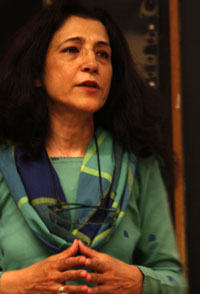 Guest Lecturer: Ayesha Jalal
Guest Lecturer: Ayesha Jalal
Mary Richardson Professor of History, South Asia, the Muslim World; Director of Center for South Asian and Indian Ocean Studies, Tufts University
Dr. Jalal joined Tufts University as a tenured full professor in the fall of 1999. Since 2003, she has held a joint appointment at the History Department and The Fletcher School of Law and Diplomacy. Between 1998-2003, she was a MacArthur Fellow. Her publications include: Partisans of Allah: Jihad in South Asia, (Harvard University Press, 2008); Self and Sovereignty: the Muslim Individual and the Community of Islam in South Asia, (London: Routledge, 2000); Modern South Asian History, Culture, Political Economy, joint author with Sugata Bose (London: Routledge, 1998); Nationalism, Democracy and Development: State and Politics in India, joint editor with Sugata Bose (Delhi: Oxford U Press, 1997); Democracy and Authoritarianism in South Asia: a Comparative and Historical Perspective, (Cambridge: Cambridge U Press, 1995); State of Martial Rule; the Origins of Pakistan's Political Economy of Defense, (Cambridge: Cambridge U Press, 1990); The Sole Spokesman: Jinnah, the Muslim League, and the Demand for Pakistan, (Cambridge: Cambridge U Press, 1985). Her forthcoming publication is Battle for Pakistan.
Readings:
Books
• Government and Politics in South Asia, Malik et al, pp. 1-232
• Nationalism, Democracy, and Development, Bose and Jalal, pp.76-103
Handouts
• Modern South Asia: History, Culture, Politics, Economy, Bose and Jalal, pp. 1-85
• Partisans of Allah: Jihad in South Asia, pp. 1-19, 239-314
September 22nd
Discussion of "On the Grand Trunk Railroad"
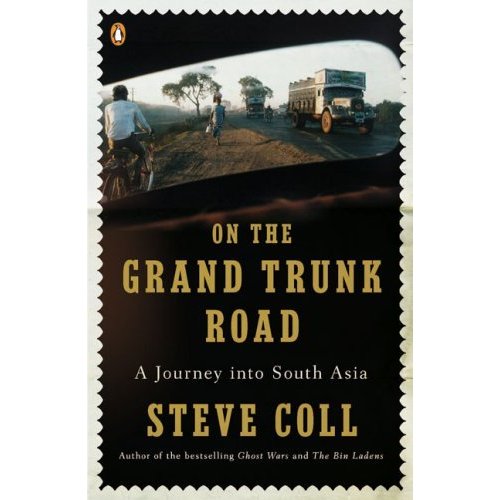
September 24
Democracy and Development in Bangladesh: Prospects and Problems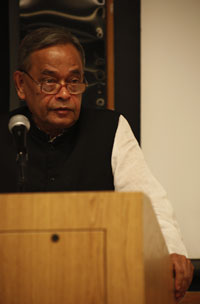 Guest Lecturer: Dr. Muhiuddin Khan Alamgir
Guest Lecturer: Dr. Muhiuddin Khan Alamgir
Dr. Muhiuddin Khan Alamgir is a member of parliament from the Awami League and was Bangladesh's State Minister for Planning from 1997 to 2001. A career economist, he taught at Dhaka University until 1965 before joining the civil service. He retired in 1997 after serving as Secretary to the Prime Minister and leading the negotiation of two landmark treaties: the Ganges Water Sharing Treaty with India and a Peace Treaty with insurgents in the Chittagong Hill Tracts. He joined politics afterwards and has spent more than two years in jail for his outspoken views, imprisoned and tortured once by the BNP government on treason charges and once by the 2007-8 military-led caretaker administration on 'corruption' charges that have been dismissed by the High Court. He has a Ph.D. in economics from Boston University and has authored more than twenty books in English and Bengali. His next book, Notes from a Prison: Bangladesh, is due to be published in October 2009
Readings
Book
• Government and Politics in South Asia, Malik et al, pp. 233-304 (recommended)
Handouts
• “Bangladesh’s Fresh Start” by Jalal Alamgir, Journal of Democracy
• Economic Growth in Bangladesh: Experience and Policy Priorities” by Jyoti Rahman and Asif Yusuf
September 29
Dilemmas of Aid, Development and Security
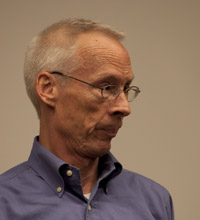 Guest Lecturer: Mark S. Ward
Guest Lecturer: Mark S. Ward
Dr. Wilder joined the Feinstein Center in January 2007
Mark S. Ward is the Special Advisor on Development to the Special Representative of the Secretary General for the United Nations Assistance Mission in Afghanistan (UNAMA), based in Kabul. He is responsible for implementation fo unama's mandate to improve donor coordination and aid effectiveness in Afghanistan. Before joining UNAMA, Ward was Seior Deputy Assistant for the Bureau for Asia at the U.S. Agency for Intrnational Development (USAID) and a Career Minister in the U.S. Senior Foreign Service.
He had principal responsbility for USAID programs in South and EAst ASia. He was also chair of the Agency's tsunami task force, the South Asia earthquake task force and the Lebanon Reconstruction task force. Ward was the 2006 winner of the Service to America Medal for international affairs. Ward's last overseas post with USAID was in Pakistan as the Mission Director, serving from July 2002 through December 2003. Prior to that, he was the Director of USAID's Office of Procurement in Washingon, D.C. Ward Joined the U.S. Foreign Service in 1986 and served in Pakistan (twice), Egypt, the Philippines, and Russia. He is a native of San Francisco and received his Bachelor of Arts in political science and Juris Doctor from the University of California at Berkeley. Ward was headmaster of a girl's high school in rural Kenya before law school, and praciced law in Washington for four years.
Guest Lecturer: Andrew Wilder
Dr. Wilder joined the Feinstein Center in January 2007 to lead the 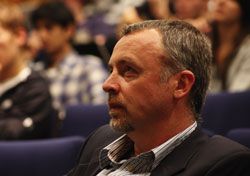 Center's research on Politics and Policy in countries affected by conflict. His areas of interest include state-building, governance, and aid-effectiveness, with a specialization on Afghanistan and Pakistan. Prior to joining the Center he worked in Afghanistan where he established and was the Director of Afghanistan's first independent policy research institution, the Afghanistan Research and Evaluation Unit (AREU). Between 1986 and 2001, he worked for several different international NGOs managing humanitarian and development programs in Pakistan and Afghanistan, including for six years as the Director of the Pakistan/Afghanistan program of Save the Children (US). He is the author of The Pakistani Voter (Oxford University Press, 1999), a co-author of A Guide to Government in Afghanistan (AREU, 2004), and the author of several book chapters, journal articles and briefing papers. His recent research and publications have looked at police reform policies in Afghanistan, Afghan refugee education policy in Pakistan, the politics of civil service reform in Pakistan, electoral politics and policies in Pakistan and Afghanistan, and the politics of sub-national administration in Afghanistan.
Center's research on Politics and Policy in countries affected by conflict. His areas of interest include state-building, governance, and aid-effectiveness, with a specialization on Afghanistan and Pakistan. Prior to joining the Center he worked in Afghanistan where he established and was the Director of Afghanistan's first independent policy research institution, the Afghanistan Research and Evaluation Unit (AREU). Between 1986 and 2001, he worked for several different international NGOs managing humanitarian and development programs in Pakistan and Afghanistan, including for six years as the Director of the Pakistan/Afghanistan program of Save the Children (US). He is the author of The Pakistani Voter (Oxford University Press, 1999), a co-author of A Guide to Government in Afghanistan (AREU, 2004), and the author of several book chapters, journal articles and briefing papers. His recent research and publications have looked at police reform policies in Afghanistan, Afghan refugee education policy in Pakistan, the politics of civil service reform in Pakistan, electoral politics and policies in Pakistan and Afghanistan, and the politics of sub-national administration in Afghanistan.
Readings
Handouts
• “The Afghanistan Impasse” by Ahmed Rashid, The New York Review of Books, October 8, 2009
• “The Irresistible Illusion” by Rory Steward, London Review of Books, July 9, 2009
• Cops or Robbers? The Struggle To Reform the Afghan National Police by Andrew Wilder, Afghanistan Research and Evaluation Unit, July 2007
• “Reconstruction as Modernisation: The 'Post-Conflict' Project in Afghanistan” by Astri Suhrke, Third World Quarterly, October 2007
• “Understanding State-Making and Local Government In Afghanistan” by Sarah Lister
Crisis States Research Centre, May 2007
• “Damning Afghanistan: Modernization in a Buffer State” by Nick Cullather, The Journal of American History, September 2002
October 2-Sunday, October 4
EPIIC Weekend Immersion - Outward Bound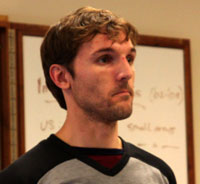 Guest Lecturer: Jake Sherman
Guest Lecturer: Jake Sherman
Limits of Statebuilding and Counterinsurgency
Mr. Jake Sherman (EPIIC ’96) is the Associate Director for Peacekeeping and Security Sector Reform at the New York University Center on International Cooperation. Prior to joining CIC, Mr. Sherman was a consultant on peacebuilding issues in Cambodia for Oxfam GB, the American Friends Service Committee, and the Alliance for Conflict Transformation. He has worked as the Political Officer for the United Nations Assistance Mission in Afghanistan and for the International Peace Academy, and Physicians for Human Rights in the Balkans. During 2008, Mr. Sherman was seconded to the secretariat of the Independent Panel on Safety and Security of UN Personnel and Premises. His publications include, Survey of the United States Government’s Arrangements for Monitoring and Evaluating Support to Security Sector Reform, “The Afghan National Development Strategy: The Right Plan at the Wrong Time?”, “Afghanistan: Nationally-Led State-Building”, “Counter-Narcotics to Stabilize Afghanistan: The False Promise of Crop Eradication”, and “Economic Factors in Civil Wars: Policy Considerations”.
Readings
Books
• Ghost Wars: The Secret History of the CIA, Afghanistan, and Bin Laden, Steve Coll, all
• Descent into Chaos: The United States and the Failure of Nation Building in Pakistan, Afghanistan, and Central Asia, Ahmed Rashid, all
Handouts
• Shadow War: The Untold Story of Jihad in Kashmir, Arif Jamal, pp. 131-59
• “The Future of Afghanistan”, Alexander Their, USIP, all
• “A Strategy for Stabilizing Afghanistan-Pakistan”, Asia Society
• “Agreement on Provisional Arrangements in Afghanistan Pending the
Re-establishment of Permanent Government Institutions” [the “Bonn
Agreement”]
• “From Great Game to Grand Bargain,” Barnett Rubin and Ahmed Rashid, Foreign Affairs, Nov/Dec 2008
• “Afghanistan: Nationally-led Statebuilding” by Jake Sherman from Building States to Build Peace, Call and Wyeth (eds)
• “The Public Cost of Private Security in Afghanistan,” by Jake Sherman and Victoria DiDomenico, CIC Briefing Paper
October 1
FIRST EXAM
(EPIIC exams generally run over the 5:30pm mark; you will have until 7pm to complete the exam.)
October 6
Guest Lecturers:
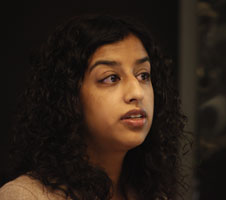
Dipali Mukhopadhyay
Warlordism, Governance & the State in Post-2001 Afghanistan
Dipali Mukhopadhyay is a doctoral candidate at The Fletcher School of Law and Diplomacy and a Jennings Randolph Dissertation Scholar at the U.S. Institute of Peace. Mukhopadhyay is writing her dissertation on state building and provincial governance in Afghanistan, particularly on the role of warlord commanders-turned- provincial governors. She has conducted nearly 150 interviews in Kabul, as well as in northern and eastern Afghanistan, having spent several months in-country in 2007 and 2008. She also served as a consultant to the Agha Khan Development Network in summer 2004 in the northeastern province of Badakhshan, where she conducted con?ict analysis training and research on the drug economy.
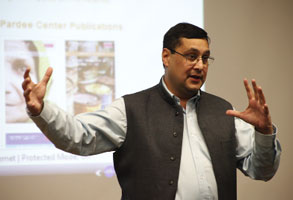 Adil Najam
Adil Najam
Asia 2060 Project
Adil Najam is the Director of the Frederick S. Pardee Center for the Study of the Longer-Range Future and Professor of International Relations and Geography and the Environment at Boston University. Professor Najam served as a Lead Author for the Intergovernmental Panel on Climate Change (IPCC), work for which the IPCC was awarded the 2007 Nobel Peace Prize along with Al Gore. In 2009, Najam was appointed to serve on the UN Committee for Development Policy, a 24-member panel that advises the UN Economic and Social Council. Professor Najam is an expert in international diplomacy and development. His research interests include sustainable development, Muslim and South Asian politics, environmental politics in developing countries, and philanthropy among immigrant communities in the United States. Much of his work has focused on longer-term global policy problems, especially those related to human well-being and sustainable development. He contributed to Pakistan's first environmental policy document, as well as to that country's report to the 1992 Rio Earth Summit, has worked closely with governments and civil society in both industrialized and developing countries, and regularly collaborates with the United Nations.
Reading
• “Warlords as Bureaucrats: The Afghan Experience” by Dipali Mukhopadhyay, Carnegie Papers, Middle East Program
• Series of op-ed contributions on "10 steps to victory in Afghanistan" http://www.nytimes.com/2009/10/04/opinion/04afghanistan.html
Assignment Due: Outward Bound Weekend Reaction
October 8
Larger Geopolitical Context of South Asia: Boundaries, Borders and Energy
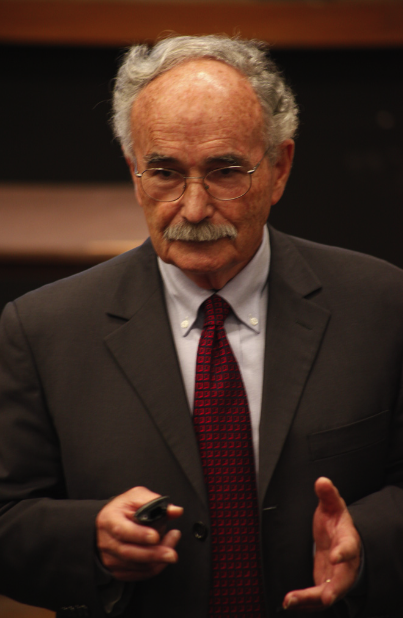 Guest Lecturer: Andrew Hess
Guest Lecturer: Andrew Hess
Director, The Program for Southwest Asia and Islamic Civilization (http://fletcher.tufts.edu/swaic/), the Contemporary Turkish Studies Program, and the Kuwaiti, Qatari, and Armenian Foreign Service Training Programs, The Fletcher School of Law and Diplomacy; taught at The American University in Cairo and Temple University; held executive positions, Arabian American Oil Company (Saudi Arabia)
Readings
Handouts (one will be available Monday afternoon, the other Tues afternoon)
• Invisible History: Afghanistan’s Untold Story by Paul Fitzgerald and Elisabeth Gould, pp 223-331
• Rising Posers, Shrinking Planet by Michael T. Klare, pp. 1-87
Assignments: First Paper topics will be distributed – papers are due October 15
October 13
No Class – Monday’s Schedule
October 15
The Legacy of Eqbal Ahmad: Perspectives on South Asia
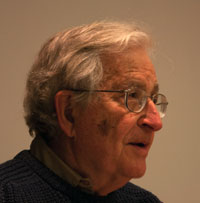 Guest Lecturer: Noam Chomsky
Guest Lecturer: Noam Chomsky
Noam Chomsky joined the staff of the Massachusetts Institute of Technology in 1955 and in 1961 was appointed full professor in the Department of Modern Languages and Linguistics (now the Department of Linguistics and Philosophy.) He has written and lectured widely on linguistics, philosophy, intellectual history, contemporary issues, international affairs and U.S. foreign policy. His works include: Language and Mind; American Power and the New Mandarins; At War with Asia; For Reasons of State; Peace in the Middle East?; Reflections on Language; The Political Economy of Human Rights, Vol. I and II (with E.S. Herman); Rules and Representations; Lectures on Government and Binding; Towards a New Cold War; Radical Priorities; Fateful Triangle; Knowledge of Language; Turning the Tide; Pirates and Emperors; On Power and Ideology; Language and Problems of Knowledge; The Culture of Terrorism; Manufacturing Consent (with E.S. Herman); Necessary Illusions; Deterring Democracy; Year 501; Rethinking Camelot: JFK, the Vietnam War and US Political Culture; Letters from Lexington; World Orders, Old and New; The Minimalist Program; Powers and Prospects; The Common Good; Profit Over People; The New Military Humanism; New Horizons in the Study of Language and Mind; Rogue States; A New Generation Draws the Line; 9-11; and Understanding Power.
Reading
Book
• In the Graveyard of Empires: America’s War in Afghanistan, Seth G. Jones, all
Handout
• The Selected Writings of Eqbal Ahmad, pp. 389-566
October 20
Poverty and Human Rights in Asia
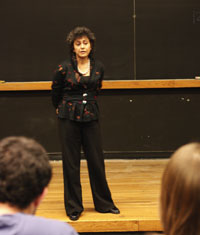 Guest Lecturer: Irene Khan
Guest Lecturer: Irene Khan
Irene Khan joined Amnesty International as Secretary General in August 2001. The first woman, first Asian and first Muslim to head the world’s largest human rights organization, she has led AI through developments in the wake of September 11, confronting the backlash against human rights; broadening the work of the organization in areas of economic, social and cultural rights; and bringing a strong focus to the issue of women’s human rights and violence against women. Irene reformed Amnesty International’s response to crisis situations, personally leading high level missions to Pakistan, Afghanistan, Israel/Occupied Territories, Colombia, the Democratic Republic of Congo, Brazil, Mexico, Turkey, Spain, Thailand, the Darfur region of Sudan and Nepal. Irene joined the United Nations High Commissioner for Refugees in 1980, and worked in a variety of positions at Headquarters and in field operations to promote the international protection of refugees. From 1991-95 she was Senior Executive Officer to Mrs. Sadako Ogata, then UN High Commissioner for Refugees. She was appointed as the UNHCR Chief of Mission in India in 1995, the youngest UNHCR country representative at that time, and in 1998 headed the UNHCR Centre for Research and Documentation. She led the UNHCR team in Former Yugoslav Republic of Macedonia during the Kosovo crisis in 1999, and was appointed Deputy Director of International Protection later that year.
She is the author of The Unheard Truth: Poverty and Human Rights
Reading
Book
• Bangladesh and Pakistan: Flirting with Failure in South Asia by William B. Milam, all
Handout
• The Unheard Truth: Poverty and Human Rights, Irene Khan, pp. 1-46, 101-122, 201-222
October 22
Foundations of India and India’s North-East
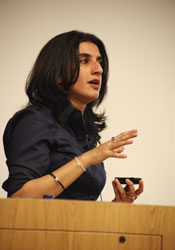 Guest Lecturer: Ananya Vajpeyi
Guest Lecturer: Ananya Vajpeyi
Professor Vajpeyi teaches South Asian history, with a focus on caste, violence and non-violence, modernity, as well as nationalism and the state. She also teaches courses on imperialism, colonialism and decolonization in Asia and Africa during the 19th and 20th centuries. In addition, she is interested in intellectual history and the comparative history of ideas in India and Europe.
Prior to her appointment at U Mass Boston, between 2002 and 2007, Dr. Vajpeyi has taught at SIPA, Columbia University, and the National Law School of India University, Bangalore. She has held post-doctoral and research fellowships at SAIS, Johns Hopkins University, Washington DC, the Nehru Memorial Museum and Library, New Delhi, the Center for Law and Governance at the Jawaharlal Nehru University, New Delhi, UNIFEM / UNDP New York, and the Waag Society for Old and New Media, Amsterdam, NL. She has also been a Scholar of Peace with WISCOMP: Women in Security, Conflict Management and Peace, New Delhi, and Opinions Editor of The Indian Express newspaper. She writes regularly for newspapers and magazines in India, the UK, and the US. Her fiction, non-fiction and opinion pieces appear in the New Statesman, Wasafiri, Civil Lines, The Economic Times, The Indian Express, Outlook, Seminar, The Economic and Political Weekly, The Calcutta Telegraph, The Times of India and The National, among other publications.
Righteous Republic: The Political Foundations of Modern India
“A History of Caste in India: From Precolonial Polity to Biopolitical State”. Chapter in a volume titled Shared Histories of Modernity: China, India and the Ottoman Empire edited by Huricihan Islamoglu and Peter Carroll
“Resenting the Indian State: For a New Political Practice in the Northeast”. Chapter in a volume titled Beyond Counter-insurgency: Breaking the Impasse in Northeast India edited by Sanjib Baruah
Readings
Handouts
• “Resenting the Indian State: For a New Political Practice in the Northeast” by Ananya Vajpeyi from Beyond Counter-insurgency: Breaking the Impasse in Northeast India edited by Sanjib Baruah
• “Another 9/11, Another Act of Terror: The Embedded Disorder of the AFSPA” by A. Bimol Akoijam from Sarai Reader 2005
• Postfrontier Blues: Towards a New Policy Framework for Northeast India” by Sanjib Baruah, Centre for Policy Research, New Delhi and East West Center, Washington, DC
• “Tagore and his India” by Amartya Sen
• “Traveling with Tagore” by Ramachandra Guha from Nationalism by Rabindranath Tagore
• The Discovery of India by Jawaharlal Nehru, pp. 3-57
• “Jawaharlal Nehru” from Between Tradition and Modernity: India’s Search for Identity, Fredd DallMayr and G.N. Devy, editors
• “Old Words, New Worlds: Revisiting the Modernity of Tradition” by Ananya Vajpeyi, Economic and Politicl Weekly, September 19, 2009
October 27
Unbundling Governance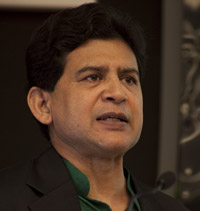 Guest Lecturer: Hossain Zillur Rahman, IGL INSPIRE Fellow
Guest Lecturer: Hossain Zillur Rahman, IGL INSPIRE Fellow
Dr. Hossain Zillur Rahman was appointed Advisor (cabinet minister) in charges of the Ministries of Commerce and Education to the Caretaker Government of Bangladesh in January 2008, which he continued until January 2009. During his tenure, he was entrusted with the lead role in the political negotiations, which saw the successful return of the country to electoral democracy. An eminent economist and social thinker, Dr. Rahman was a leading researcher at the Bangladesh Institute of Development Studies at Dhaka between 1977 and 2000. He initiated and led the internationally renowned Analysis of Poverty Trends Project at the Institute and is the author of Rethinking Rural Poverty. In 1996, Dr. Rahman founded the Power and Participation Research Centre (PPRC), a Dhaka-based think tank and has been its Executive Chairman since 2000. At PPRC, Dr. Rahman initiated major new research programs on governance and education and is the author of Unbundling Governance. Between 2002 and 2006, Dr. Rahman was the Lead Consultant for the Government of Bangladesh in preparing its strategy of accelerated poverty reduction. During this period, Dr. Rahman was also appointed to the SAARC Poverty Commission (ISACPA) and was the lead drafter of Our Future, Our Responsibility: Road-Map for a Poverty-Free South Asia. Dr. Rahman was the lead editor for finalizing the National Plan of Action (NPA II) on primary education for the Ministry of Primary and Mass Education. He is a resource person to the National Defence College. Dr. Rahman has been a consultant to many international agencies including the World Bank, Asian Development Bank, Danida, Sida, Swiss Development Cooperation, DFID.
Readings
Handouts
• Unbundling Governance, Hossain Zillur Rahman
• Bangladesh 2015: Crossing Miles..., Hossain Zillur Rahman
• State Failure in Developing Countries and Strategies of Institutional Reform, Mushtaq H. Khan, Department of Economics, SOAS, University of London.
October 29
Gender, Politics and Society in South Asia
IRB Overview – Yvonne Wakeford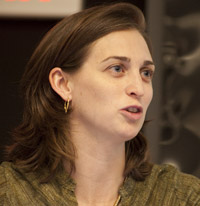 Guest Lecturer: Sarah Pinto
Guest Lecturer: Sarah Pinto
Readings
Handouts
• “Dying: In the Big, Big Hands of God” by Sarah Pinto from Where There Is No Midwife: Birth and Loss in Rural India (New York: Berghahn, 2008)
• “Development Without Institutions: Ersatz Medicine and the Politics of Everyday Life in North India” by Sarah Pinto, Cultural Anthropology 19(3), 2004.
• "Crises of Commitment: Ethics of Intimacy, Care and Confinement in Global Psychiatry", Sarah Pinto, Medical Anthropology, 28(1) 2009.
• “Writing Lives, Underwriting Silences: Understanding Dowry Death in Contemporary India,” by Veena Oldenburg, from Dowry Murder: The Imperial Origins of a Cultural Crime. (Oxford: Oxford University Press, 2002).
• “Contentious Traditions: The Debate on Sati in Colonial India” by Lata Mani in Recasting Women: Essays in Indian Colonial History, Kumkum Sangari and Sudesh Vaid, ed. (New Brunswick: Rutgers University Press, 1989)
• “Communities as Political Actors: The Question of Cultural Rights” by Veena Das, from Critical Events: An Anthropological Perspective on Contemporary India (Delhi: Oxford University Press, 1995).
• “National Honor and Practical Kinship” by Veena Das in Conceiving the New World Order, Faye Ginsburg and Rayna Rapp, ed. (Berkeley: University of California Press, 1994).
• “Gender, Violence and Power: Rajasthani Stories of Shakti” by Ann Grodzins Gold in Women as Subjects: South Asian Histories, Nita Kumar, ed. (Delhi: Stree, 1994).
November 3
Poverty and Graduation Dynamics
Guest Lecturer: Hosain Zillur Rahman, IGL INSPIRE Fellow Dr. Hossain Zillur Rahman was appointed Advisor (cabinet minister) in charges of the Ministries of Commerce and Education to the Caretaker Government of Bangladesh in January 2008, which he continued until January 2009. During his tenure, he was entrusted with the lead role in the political negotiations, which saw the successful return of the country to electoral democracy. An eminent economist and social thinker, Dr. Rahman was a leading researcher at the Bangladesh Institute of Development Studies at Dhaka between 1977 and 2000. He initiated and led the internationally renowned Analysis of Poverty Trends Project at the Institute and is the author of Rethinking Rural Poverty. In 1996, Dr. Rahman founded the Power and Participation Research Centre (PPRC), a Dhaka-based think tank and has been its Executive Chairman since 2000. At PPRC, Dr. Rahman initiated major new research programs on governance and education and is the author of Unbundling Governance. Between 2002 and 2006, Dr. Rahman was the Lead Consultant for the Government of Bangladesh in preparing its strategy of accelerated poverty reduction. During this period, Dr. Rahman was also appointed to the SAARC Poverty Commission (ISACPA) and was the lead drafter of Our Future, Our Responsibility: Road-Map for a Poverty-Free South Asia. Dr. Rahman was the lead editor for finalizing the National Plan of Action (NPA II) on primary education for the Ministry of Primary and Mass Education. He is a resource person to the National Defence College. Dr. Rahman has been a consultant to many international agencies including the World Bank, Asian Development Bank, Danida, Sida, Swiss Development Cooperation, DFID.
Dr. Hossain Zillur Rahman was appointed Advisor (cabinet minister) in charges of the Ministries of Commerce and Education to the Caretaker Government of Bangladesh in January 2008, which he continued until January 2009. During his tenure, he was entrusted with the lead role in the political negotiations, which saw the successful return of the country to electoral democracy. An eminent economist and social thinker, Dr. Rahman was a leading researcher at the Bangladesh Institute of Development Studies at Dhaka between 1977 and 2000. He initiated and led the internationally renowned Analysis of Poverty Trends Project at the Institute and is the author of Rethinking Rural Poverty. In 1996, Dr. Rahman founded the Power and Participation Research Centre (PPRC), a Dhaka-based think tank and has been its Executive Chairman since 2000. At PPRC, Dr. Rahman initiated major new research programs on governance and education and is the author of Unbundling Governance. Between 2002 and 2006, Dr. Rahman was the Lead Consultant for the Government of Bangladesh in preparing its strategy of accelerated poverty reduction. During this period, Dr. Rahman was also appointed to the SAARC Poverty Commission (ISACPA) and was the lead drafter of Our Future, Our Responsibility: Road-Map for a Poverty-Free South Asia. Dr. Rahman was the lead editor for finalizing the National Plan of Action (NPA II) on primary education for the Ministry of Primary and Mass Education. He is a resource person to the National Defence College. Dr. Rahman has been a consultant to many international agencies including the World Bank, Asian Development Bank, Danida, Sida, Swiss Development Cooperation, DFID.
Readings
Handouts
• Cooperative Antagonism in Development Research: A Perspective From Bangladesh, Manzurul Mannan
• Poverty: The Challenges of Graduation, Hossain Zillur Rahman
• Poverty and Property Rights, Hossain Zillur Rahman
• Our Future, Our Responsibility, Report of the Independent South Asian Commission on Poverty Alleviation, Road-Map Towards a Poverty-Free South Asia, SAARC, 2003
• Development Strategies for the Next Century, Dani Rodrik, Harvard University
• The Compulsions of Democracy and Poverty, India Since Independence, Professor Amit Bhaduri
• Development Dialogues: Amit Bhaduri - Predatory growth, Saturday, 23 February, 2008
• Researching Poverty from the Bottom Up, edited by Hossain Zillur Rahman, pp. 1-94, 127-28
November 17
Proliferation and Corruption in South Asia
Guest Lecturer: Jack Blum
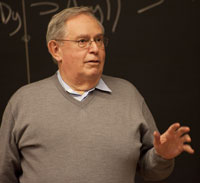 Mr. Blum is an internationally recognized legal authority on money laundering, tax enforcement, congressional, state and foreign governmental investigations, regulatory compliance and related federal legislation, including the USA PATRIOT Act.
Mr. Blum is an internationally recognized legal authority on money laundering, tax enforcement, congressional, state and foreign governmental investigations, regulatory compliance and related federal legislation, including the USA PATRIOT Act.
During his fourteen year tenure as counsel to various United States Senate Committees, including the Senate Foreign Relations Committee, the
Senate Judiciary Committee and the Subcommittee on Antitrust and
Monopoly, Mr. Blum played a key role in conducting several high-profile
investigations, including the investigation of BCCI, General Noriega’s drug trafficking and the Lockheed Corporation’s overseas bribes scandal.
He often serves as an expert witness and consultant on fraud and money
laundering for U.S. and foreign government agencies. Mr. Blum also chaired the United Nations Experts Group on asset recovery.
Mr. Blum focuses his practice on advising businesses dealing with congressional investigations and conducting internal investigations into complex money laundering and international tax evasion disputes.
Reading
Book
• The Man from Pakistan by Douglas Frantz and Catherine Collins
November 19
Contemporary India and the Legacy of Ayodyha Mosque/Bamyan
Guest Lecturer: Sugata Bose
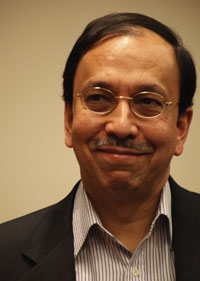
Gardiner Professor of Oceanic History and Affairs at Harvard University,
Bose's field of specialization is modern South Asian and Indian Ocean
history. He obtained his Ph.D. from the University of Cambridge. His
most recent book is A Hundred Horizons: the Indian Ocean in the Age of
Global Empire (Cambridge, MA: Harvard University Press, 2006.) In it
Bose crosses area studies and disciplinary frontiers and bridges the
domains of political economy and culture. He was a recipient of the
Guggenheim Fellowship in 1997. Other publications include: Modern South
Asia: History, Culture, Political Economy with Ayesha Jalal (2004);
Nationalism, Democracy and Development with Ayesha Jalal (1997); Credit,
Markets and the Agrarian Economy of Colonial India (1994); Peasant
Labour and Colonial Capital in The New Cambridge History of India series
(1993); South Asia and World Capitalism (1990); and Agrarian Bengal:
Economy, Social Structure and Politics in Cambridge University Press (1986).
Reading
Book
• Imagining India by Nandan Nilekani
(there will be some additional readings as well)
November 24
| Presentation of penultimate symposia concepts | Update on Special events committee |
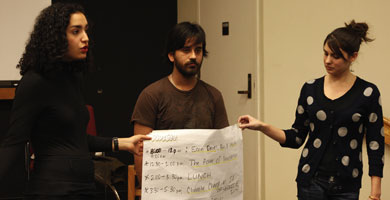 |
 Introduction to EPIIC's Cricket team coach Adrian King |
December 1
Fletcher South Asian Students Panel; Personalized Perspectives on Identity and Education
Guest Panelists: Rahul Bhatnagar, Qiamuddin Amiry, Maria Hassan, Cliff Polycarp, and Dania Khan
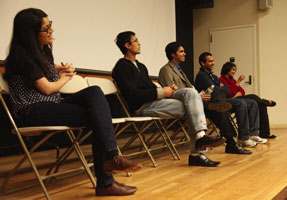 Five Fletcher students representing India, Pakistan, and Afghanistan joined EPIIC on Tuesday December 1, 2009 for an intimate panel discussion sharing life stories, critical history, and personal analysis from the region. Panelists opened with a 10-minute presentation of their intellectual history and personal journey from South Asia to the Tufts Campus. Five distinct narratives emerged to provide EPIIC students a rich, vibrant, and highly engaging picture of the region. Such personal detail and dynamic interaction is largely inaccessible through texts alone or expert lecturers. The discussion that followed was driven by a series of nuanced questions from EPIIC students regarding the geopolitics and security challenges of the region. The discussion however quickly veered away from theoretical politics and gravitated toward issues of conflicting identities, economic privilege, and the benefits of international education. In the end it seemed the discussion generated a palpable sense of the complexities of community and further invigorated students' goals to get involved in the region through research, travel, and future livelihoods.
Five Fletcher students representing India, Pakistan, and Afghanistan joined EPIIC on Tuesday December 1, 2009 for an intimate panel discussion sharing life stories, critical history, and personal analysis from the region. Panelists opened with a 10-minute presentation of their intellectual history and personal journey from South Asia to the Tufts Campus. Five distinct narratives emerged to provide EPIIC students a rich, vibrant, and highly engaging picture of the region. Such personal detail and dynamic interaction is largely inaccessible through texts alone or expert lecturers. The discussion that followed was driven by a series of nuanced questions from EPIIC students regarding the geopolitics and security challenges of the region. The discussion however quickly veered away from theoretical politics and gravitated toward issues of conflicting identities, economic privilege, and the benefits of international education. In the end it seemed the discussion generated a palpable sense of the complexities of community and further invigorated students' goals to get involved in the region through research, travel, and future livelihoods.
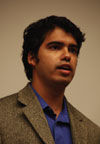
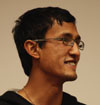
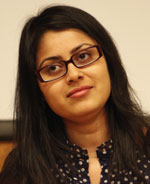

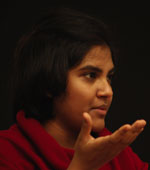
L to R: Rahul Bhatnagar, Qiamuddin Amiry, Maria Hassan, Cliff Polycarp, and Dania Khan.
December 3
Discussion of the Implications of the Obama Af-Pak Policy
Guest Lecturer: Antonia Chayes
Antonia Chayes is a prominent international legal scholar and practitioner.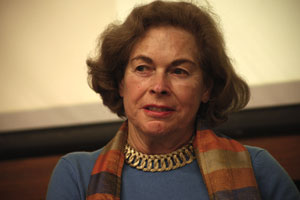 Toni’s career-long commitment to peace and justice has focused on teaching future leaders international law and politics toward the end of instilling in others both the skills and values to work toward a more stable and humane world. She is currently Visiting Professor of International Politics and Law at the Fletcher School of Law and Diplomacy, where she teaches courses on international treaty compliance and the law and politics of international conflict management. Her research interests range across conflict resolution and peacebuilding; international courts; international organizations; nuclear strategy; nuclear weapons; international security and arms control; and treaty compliance.
Toni’s career-long commitment to peace and justice has focused on teaching future leaders international law and politics toward the end of instilling in others both the skills and values to work toward a more stable and humane world. She is currently Visiting Professor of International Politics and Law at the Fletcher School of Law and Diplomacy, where she teaches courses on international treaty compliance and the law and politics of international conflict management. Her research interests range across conflict resolution and peacebuilding; international courts; international organizations; nuclear strategy; nuclear weapons; international security and arms control; and treaty compliance.
Toni joined Fletcher after a long and prolific career of teaching at the Kennedy School of Government, Harvard University (1981-2003). She chairs the Project on Compliance and International Conflict Management at the Program on Negotiation at the Harvard Law School, which advises heads of government and corporations. Toni also served as Senior Advisor and Vice Chair of the Conflict Management Group, a non-profit international dispute resolution organization. Toni’s commitment to achieving peace through negotiation has sought domestic expression, as well, in her work with and leadership of ENDISPUTE, a national dispute resolution center where she continues to provide mediation expertise for corporate disputes. As a Board member of United Technologies  Corporation for 21 years, she chaired its Public issues Review Committee, and served on its Executive Committee until retiring in 2002.
Corporation for 21 years, she chaired its Public issues Review Committee, and served on its Executive Committee until retiring in 2002.
Not an academic alone, Toni has ventured to Washington, DC to break new gender-ground by serving as President Carter’s Assistant Secretary, and later, Under Secretary of the US Air Force for (1977-1981), where she was awarded the Distinguished Service Medal. She has served on several federal commissions, including the Vice President’s White House Aviation Safety and Security Commission, and the Commission on Roles and Missions of the United States Armed Forces.
Toni is a tireless advocate for international law and peace, testifying before Congress when called upon, providing expert commentary on CNN, and authoring and editing books on topics ranging from conflict prevention to how to restore a working society in a post-conflict world (see list of published books below), journal articles, and op-eds with her characteristic clarity and élan.
She was recently honored with the Radcliffe Alumnae Award in recognition of her career of distinguished service. She is also a recipient of the Dr. Jean Mayer Global Citizenship Award.
Readings
Handouts
• "Anbar Dawn...the Defeat of Al Qaeda in the West", a lecture delivered at the Fletcher School by Lt. Gen. John R. Allen on March 11, 2009 (attached)
• The Accidental Guerrilla by David Kilculler, pp 1-114, 224-306
• and there will be a few more
December 8
Justice
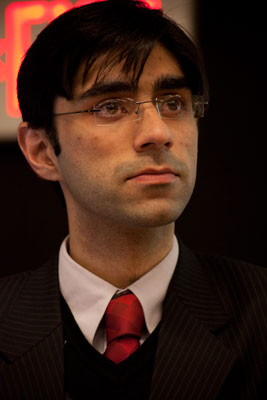 3:00 - 4:00pm
3:00 - 4:00pm
Contemporary Pakistan: Dilemmas of Security and Development
Guest Lecturer: Moeed Yusuf
Moeed Yusuf is a PhD student and Teaching Fellow at Boston University’s Political Science Department and a Research Fellow at the Boston University Pardee Center. He is also a Research Fellow at Strategic and Economic Policy Research, Pakistan and a Visiting Associate at the Sustainable Development Policy Institute (SDPI), Pakistan. Most recently, he was based at the Brookings Institution as a Special Guest researcher.
Moeed Yusuf has taught courses on political economy and defense economics at the Department of Defence and Strategic Studies at Quaid-e-Azam University, Pakistan. He writes a weekly column in The Friday Times, Pakistan’s leading English weekly paper. He has served as a member of a number of advisory groups in Pakistan including the working group on poverty for Pakistan’s Medium Term Development Framework.
Moeed Yusuf’s research focuses on strategic concerns related to South Asia, especially those falling within the ambit of Pakistan and India’s security policy, the political economy of democratic transitions in Pakistan, as well as developmental issues related to South Asian trade and poverty. He is currently engaged in authoring a compilation on Pakistan’s security and political environment.
Readings
- Yusuf, Moeed, "Rational Institutional Design, Perverse Incentives, and the US-Pakistan Relationship post-9/11," Defense Against Terrorism Review, Vol.2, No.1, Spring 2009.
- Yusuf, Moeed, "Prospects of Youth Radicalization in Pakistan: Implications for U.S. Policy," Brookings Institution, 2008.
- Daniel Markey's Foreign Affairs piece "False Choice in Pakistan"
- Ashly Tellis, "Reconciling with the Taliban: An Alternative grand Strategy.........."
- "Whats the Problem with Pakistan", Foreign Affairs, March 2009
- Shaun Gregory, "The Security of Nuclear Weapons in Pakistan" Nov 2007
- Atlantic Council of the United States, Needed: A Comprehensive U.S. Policy Towards Pakistan, February 2009
- Hassan Abbas; Pakistan Can Defy the Odds: How to Rescue a Failing State; May 2009
- Quarterly economic update of the State Bank of Pakistan
Concepts of Justice and South Asia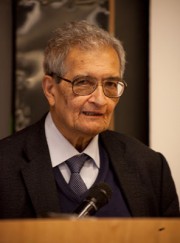 Guest Lecturer: Amartya Sen
Guest Lecturer: Amartya Sen
Amartya Sen is Thomas W. Lamont University Professor, and Professor of Economics and Philosophy, at Harvard University and was until recently the Master of Trinity College, Cambridge. He has served as President of the Econometric Society, the Indian Economic Association, the American Economic Association and the International Economic Association. He was formerly Honorary President of OXFAM and is now its Honorary Advisor. Born in Santiniketan, India, Amartya Sen is an Indian citizen. He studied at Presidency College in Calcutta, India, and at Trinity College, Cambridge. He was Lamont University Professor at Harvard also earlier, from1988–1998, and previous to that he was the Drummond Professor of Political Economy at Oxford University, and a Fellow of All Souls College (he is now a Distinguished Fellow of All Souls). Prior to that he was Professor of Economics at Delhi University and at the London School of Economics.
Amartya Sen’s books have been translated into more than thirty languages, and include Choice of Techniques (1960), Collective Choice and Social Welfare (1970), On Economic Inequality (1973, 1997), Poverty and Famines (1981), Choice, Welfare and Measurement (1982), Resources, Values and Development (1984), On Ethics and Economics (1987), The Standard of Living (1987), Inequality Reexamined (1992), Development as Freedom (1999), Rationality and Freedom (2002), The Argumentative Indian (2005), Identity and Violence: The Illusion of Destiny (2006) and The Idea of Justice (2009). His research has ranged over a number of fields in economics, philosophy, and decision theory, including social choice theory, welfare economics, theory of measurement, development economics, public health, gender studies, moral and political philosophy, and the economics of peace and war. He was the first recipient of the Dr. Jean Mayer Global Citizenship Award.
Readings
Book
- The Idea of Justice, by Amartya Sen, all
Handouts
- The Argumentative Indian, Amartya Sen, pp. 3- 193, 220- 251
EPIIC 2009-2010 Class Bios
 |
KHUDEJHA ASGHAR Khudejha Asghar is a senior from Cambridge, Massachusetts, majoring in International Relations and Community Health. When not in class, she enjoys engaging her peers through student groups within the Tufts community. She has held positions in student organizations such as the Social Justice Arts Initiative, African Student Organization and Multiracial Organization of Students at Tufts, and local initiatives such as EmergencyBoston. She is passionate about social justice and health equity, especially as injustices pertain to consequences directly related to health, and hopes to tackle these issues professionally. This year, she will be heading the Social Justice Arts Initiative, a John M. Tisch College of Citizenship and Public Service project focusing on addressing local and global issues of social justice through artistic mediums on campus and in the larger Tufts community. |
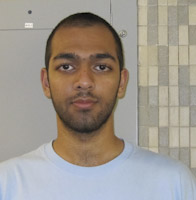 |
SYED ASAD BADRUDDIN Syed Asad Badruddin is a sophomore majoring in International Relations and Economics and maybe minoring in a few things as well. He is from Karachi, Pakistan where he spent his formative years before coming to Tufts. Beyond academics, he is interested in break dancing, politics, journalism (he writes for the Tufts Roundtable) and radio. At EPIIC he hopes to intellectually challenge and assess politics, economics, education and culture in South Asia. This year he also hopes to make use of the IGL’s Exposure program so that he can do some photojournalism during his future travels. At some point in the future he also hopes to run the Boston Marathon. In his spare time, he likes to listen to music and hang out with friends. |
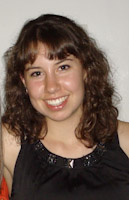 |
JENNIFER DANN-FENWICK Jennifer Dann-Fenwick is a sophomore at Tufts University. She is a British citizen but currently lives just outside of Chicago. In high school, Jennifer did a summer internship with an NGO at the United Nations and this experience sparked her interest in International Relations. She also had a successful rowing career in high school and continues to row at Tufts. On campus, Jenny is also a member of NIMEP and is a writer for the Observer. She is particularly interested in economic development, counter-insurgency, and failed states. |
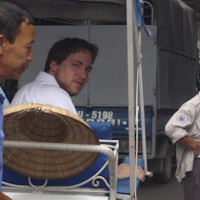 |
JOSH DEULL Josh Deull is just coming back from a year off working on the Obama campaign and traveling the world. He has newly rediscovered his passions for the outdoors and making things with his hands. For as long as Josh can remember, he has been enmeshed in hunger and development issues, and has volunteered and worked in the field on four continents. When not in class or doing readings, Josh can usually be found reconnecting with old friends, watching DVD marathons, or plotting his next trip. Coming from the heart of New York City, Josh has grown up around diversity, and the interactions and interconnectedness of people around the world has been of continued interest to him. He is very excited to be part of EPIIC 09/10 and on the lookout for ways to get involved. |
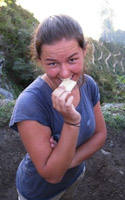 |
ALEXANDRA DUNCAN Alexandra Duncan is a freshman, and as such has not yet settled on a major, though she is thinking about majoring in International Relations. Alexandra was born in England and currently resides in Connecticut. She spent the past 15 months traveling for her gap year, spending two weeks in Uganda with Invisible Children and then circumnavigating the globe with Thinking Beyond Borders, an organization that provides gap year students with an introduction to issues of international development while teaching them to be proactive agents of change. Alexandra was a figure skater up until the start of her gap year and is currently considering her options for extracurricular activities at Tufts. |
 |
JULIA EVANS Julia is a humbled freshman on the Tufts’ campus as part of the EPIIC program. With the right wit and charm, she made her way up from small town Little Rock, Arkansas into the big tracks of Tufts University Jumbo status. Not only does Tufts provide her with a dream atmosphere, but the EPIIC program will soon expose the ideas, politics, cultures, and conflict of South Asia that before were barely recognizable to Julia. After involvement in Model United Nations and extensive intrigue in the realm of poetry and writing throughout high school, Julia has little idea as to her major yet. She does embrace the whirlwind of opportunities that the Institute for Global Leadership has to offer. Julia has all her excitement and anticipation for her career as a student wrapped in a golden spool, slowly releasing itself into adventure with EPIIC looping her first thread. From closed minds to open arms, Julia cannot wait to absorb and relish the entirety her experience at Tufts University her golden thread unwinds completely. |
 |
ANNA GILMER Anna Gilmer is a sophomore at Tufts studying International Relations and Community Health. She has done work in Latin America with the indigenous population of Ecuador, working in the jungle to create a sustainable means of income for an indigenous Shuar-Kichwa family and in the rural highlands teaching English. In her hometown of Chapel Hill, North Carolina, Anna founded a tutoring organization called Education Amigos that reached out to young Latino immigrants who were struggling with school. Her interests include reading, writing, poetry, extreme tree climbing, extremely extreme tea drinking, guitar, percussion, colors, Spanish, mountains, and lots more. She is passionate about human rights and she loves the world. Anna is also a member of the Tisch Scholars Program at Tufts and a percussion group called B.E.A.T.s. |
 |
CHAD GORDON Chad is a third year undergraduate studying Economics and International Relations. His parents are both Jamaican, but he grew up in Kuwait, Dubai and South Florida. Besides reading for EPIIC, Chad enjoys playing/watching basketball, tennis, and soccer. He follows the Miami Heat, Roger Federer, Venus Williams and Manchester United. He also proudly represents the Jamaican Track & Field team wherever he goes. Outside of sports, Chad is a member of Big Brother Boston and has been a part of the Tufts’ Caribbean Club for two years. Chad really loves music and enjoys playing his trumpet whenever he can. Chad is extremely excited for EPIIC this year and he hopes to learn and contribute greatly to the program. |
 |
TESSA HENRY Tessa Henry is a current senior at Tuft University, with a major in International Relations and a minor in Africa and the New World. Originally from Trinidad and England, her family now lives in Philadelphia. After college she hopes to do development research in Africa or work for a think-tank in Washington DC. In her spare time she enjoys spicy food, Philadelphia Eagles games, and relaxing with her loved ones. |
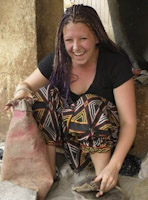 |
KELLY HOLZ Kelly Holz is a senior majoring in English and Anthropology and is thrilled to be back at Tufts after spending the year abroad. As a Gilman and a Freeman Asia Scholar, Kelly studied in Yunnan Province in China in the fall of 2008, where she learned Chinese as fast as she could to survive. She spent a month at the end of the program about seven km from the Myanmar border doing an ethnography of an overlooked minority, and spent a good deal of time actually working on the rice paddies. After backpacking around South East Asia over winter break, Kelly then flew to Cameroon for her spring semester—where she actually could communicate, as she has been studying French for eight years. She had the wonderful opportunity of working with a marabout, or roughly translated, traditional healer or witchdoctor, analyzing the influence of Christianity and modernization on traditional beliefs of the occult. She then spent the summer in California with the Middlebury Language School for Spanish, after deeming Chinese too much of a time commitment to continue, and is now wandering around campus looking for people with whom she can practice her Spanish—and flamenco, if possible! At Tufts, Kelly is highly involved with 3P’s, Tufts’ theater organization, and VOX. She also is a waitress at Legal Seafoods in Kendall, if anyone ever wants to come by and grab some crabcakes! |
 |
ANIKA HUQ Anika Huq is a junior majoring in International Relations and minoring in Economics, and is also a proud, native Long-Islander. At Tufts, she is active in the Muslim Students Association as VP of Social Affairs, coordinating events to celebrate cultures of the Islamic world. She also volunteers for Tufts Community Resources for Justice, tutoring and mentoring boys in group homes in Somerville. She hopes to expand this work to a women’s home in Boston, working with female offenders. Empowering women is a theme Anika hopes to weave throughout the course of her career at Tufts and beyond, and she considers EPIIC the perfect place to start. |
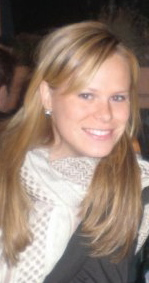 |
MARA JAMES Mara James, a senior from Washington, D.C. majoring in political science, returns to Tufts after eight months on the Obama campaign and a semester in Buenos Aires, Argentina. She is fluent in Spanish and, on an earlier visit to Buenos Aires, studied the victims of Argentina’s Dirty War at Memoria Abierta, a human rights organization dedicated to documenting the disappeared. She worked in El Salvador as a translator at a medical clinic as part of a program sponsored by International Partners. She later interned at the Salvador Allende Foundation in Madrid, administering claims for reparations by the victims of Pinochet’s regime. The Foundation was founded and run by Sr. Juan Garces, a Spanish lawyer who is the sole survivor of the military attack on Salvador Allende in the Chilean Presidential Palace in September 1973. Mara loves to travel and is interested in development and foreign policy. Without abandoning her interest in Latin America, she is looking forward to studying South Asia in EPIIC. |
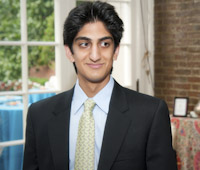 |
IMAN JAWAD Iman Jawad is a sophomore from Washington, DC. Growing up in the nation's capital has made him acutely aware of the international political climate and he has decided to major in International Relations and intends to minor in Entrepreneurial Leadership. Iman is an Afghan-American and delicately treads the line between both cultures, simultaneously in and out of both - just how he likes it. He spent the summer of 2009 interning in the foreign policy department of the great Senator Joe Lieberman's Washington, DC office. He found working in the fast-paced, rewarding Capitol Hill environment surprisingly seductive, however, does not see himself returning to it for quite some time. His interests lie primarily in the field of development as a means to greater political and social freedom in under-developed countries. He spent the summer of 2007 in Senegal volunteering for a grassroots Senegalese NGO called Tostan, dedicated to community empowerment through education, microfinance, and the non-invasive, culturally sensitive peeling back of harmful traditional practices such as female circumcision. In his spare time, Iman enjoys playing soccer, traveling and debating the finer points of football vs. futbol. |
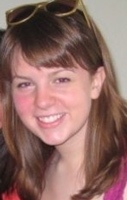 |
MEGAN KEARNS Megan Kearns is a senior majoring in Quantitative Economics. Hailing from Cortlandt Manor, New York, Meg has taught sailing lessons there for five years. Her interests lie in economic policy formation, microfinance, and market structures of developing nations. She has worked for UBS as a Wealth Management Intern, with Catalyst, Inc., conducting a census of female executives in the Fortune 500 and as a Microlending Intern with the Yonso Project. On campus, Meg is the Head Manager of Oxfam Cafe and is overseeing its renovation and restructuring. She also works at the Summer Session Office. Meg enjoys cribbage, runs along the Mystic River, fair trade coffee, and political humor. |
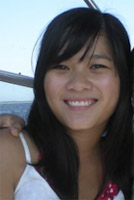 |
EUGENIA LEE Eugenia is a junior studying anthropology and international relations. Raised in New Jersey, Eugenia considers herself a citizen of the world with her second and third homes in Taipei, Taiwan and Nairobi, Kenya. She has dabbled in various activities such as interning for the Obama campaign in 2007 before the Iowa caucuses, working with two nonprofits, and spending Spring 2009 abroad living in Nairobi and studying women entrepreneurs in the Kibera slums. Currently she is working with Travel for Change, a nonprofit organization building community-based ecotourism initiatives in Africa, and is writing a blog for Tufts Admissions about the life of a transfer student. In her spare time, she enjoys photography, running, and reading her Google Reader feed. |
 |
MAIMUNA (MAIA) MAJUMDER Maia Majumder is a sophomore majoring in engineering science with a concentration in pre-medicine and a minor in philosophy. She intends to spend Winter ’09, Summer ’10, and Summer ’11 working with ICDDR, B (International Centre for Diarrhoeal Disease Research, Bangladesh) on clinical, laboratory, and field work in Dhaka, Bangladesh. Her research focus is in the epidemiology, causation, prevention, and treatment of cholera as a subsection of infectious diseases. She believes that medicine is a field that requires immense interdisciplinary skills, and she looks to EPIIC as a venture into another sphere of infectious diseases: the political, cultural, and societal approach to medicine in South Asia. Maia is also a classically trained jazz pianist, a dedicated member of the Amalgamates, Tufts’ oldest co-ed a cappella group, and is currently training to run the Boston Marathon in Spring ’10. |
 |
LAUREN MILORD Lauren Milord is a sophomore originally from South Florida, who currently lives with her family in the Chicago area. She plans on majoring in International Relations, with a concentration in Africa. She Irish danced competitively for several years and is currently involved in the Tufts Irish Dance Club. This year, Lauren is also the co-chair of Tufts Collaborative on Africa, after serving as a freshman representative to the club last year. Lauren also recently began living a raw vegan lifestyle and has started a blog about her attempt to integrate this into college life. At any given time, she can either be found carrying parts from her juicer down the hall to be washed or hiding in the corners of Tisch Library, with whom she is currently, reluctantly, involved in a turbulent love affair. |
 |
KATHERINE MONSON Katherine Monson is a freshman from Iowa City, Iowa. She intends to study International Relations, Peace and Justice Studies, and Chinese. Katherine spent her summer working as a marketing intern for a regional corporate bank, as well as working with researchers at the University of Iowa to develop software that will be used to run mock elections for use in political science research. She is interested in the issue of environmental refugees and hopes to use her rhetorical skills honed in years of debate training to advocate for those who find themselves without voices. When not busying herself with academic pursuits, Katherine loves to go on long runs that enable her to explore new places. |
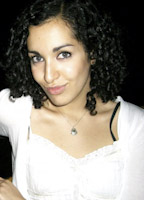 |
SABA MOVAHEDI Saba Movahedi is a sophomore at Tufts. Although she was born in the United States, she has spent the past fifteen years of her life living in Brussels, Belgium; she originates from Iran. She attended the International School of Brussels throughout the majority of her schooling alongside students from over sixty different nations. Consequently, she has always been highly interested in learning about foreign cultures, societies, traditions, and politics. In her final year of high school, Saba took part in an economics conference at the University of Navarra (Spain) where she and a group presented a development plan for Nigeria and on the grander scheme the whole of Africa. Since then, she has been intrigued with this area of studies – at Tufts, Saba is working towards a double major in Economics and International Relations with a focus on economic development. When she isn’t working, Saba enjoys cooking, reading, taking flight lessons in order to get her private pilot’s license, and picking songs to play for her radio show at the Tufts station, WMFO. |
 |
BRIAN O’REILLY Brian O’Reilly is a sophomore in the School of Arts and Sciences. He was born and raised on Long Island, New York, in a little village by the bay called Amityville. His formative years taught him to love swimming, sailing, and long walks on the beach, and that flip-flops are appropriate for all seasons and in all weather. Brian attended Regis High School in NYC, where his love for argument lead him to the speech and debate team. At Tufts, Brian plans on majoring in something related to economics and continues to debate, both out loud and on paper, for the Tufts Parliamentary Debate team and the Tufts Roundtable media platform. |
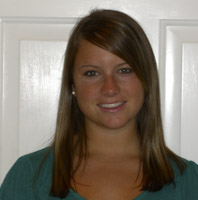 |
LESLIE OGDEN Leslie Ogden is a sophomore from Durham, North Carolina planning to major in International Relations and Political Science. Leslie spent the summer interning in Washington, D.C. for Senator Hagan (D-NC), following her passions in public policy and foreign relations, while also working in New York City with the Acumen Fund. Leslie enjoys a variety of subjects from art history to journalism to Spanish. Her interests have taken her on a variety of journeys including extensive travel throughout Latin America, and most recently in Lebanon. Some of her hobbies include yoga, tennis, going to museums, and reading. On campus, Leslie has worked as an editor on the Tufts Daily and is currently the National Security Policy Center Director for the Roosevelt Institute, a national student led think tank. |
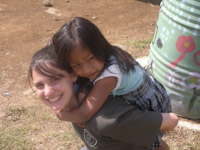 |
Emily Pantalone is a sophomore International Relations major and Economics minor. She spends most of her free time at Tufts on stage, backstage, or near the stage thanks to the Tufts student theater group 3Ps. She also had the privilege of being a member of BUILD Guatemala, a student-led group sponsored by the IGL. BUILD (Building Understanding through International Learning and Development) works to teach and educate students and communities about sustainable development practices. This past March, Emily went with BUILD to Santa Anita La Union, a small coffee cooperative in Guatemala, to help oversee the implementation of a development plan for the community. In addition, she conducted research focusing on the intricacies of Mayan identity and how they affect access to education and political representation for the culturally indigenous. This past summer, Emily spent six weeks studying in France through the Tufts in Talloires program, before returning to Pittsburgh, her hometown, to do some volunteer work. She worked for the rest of the summer at homeless and domestic violence shelters through the Homeless Children’s Education Fund, a program aimed at increasing literacy among children disadvantaged by living in a non-home environment. Emily is both honored and excited to be immersed into the wonderful EPIIC community and looks forward to delving into her research concerning South Asia. |
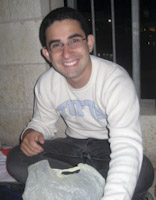 |
BEN PERLSTEIN Ben Perlstein is a freshman at Tufts University who is interested in studying Political and Cognitive Sciences, hoping to bridge the gap between the two through education policy reform one day. Originally from Acton, Massachusetts, after graduating high school in 2008, Ben spent a year living in Jerusalem as a student on the pre-college program Kivunim: New Directions, through which he studied Hebrew, Arabic, Middle Eastern history, politics and culture, and international Jewish communities. As part of the program, throughout the past year Ben traveled to ten countries around the world, including India, which lies at the center of his enthusiasm for being part of EPIIC this year. |
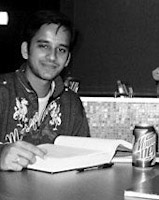 |
SAMUJJAL (SHAYAN) PURKAYASTHA Samujjal Purkayastha or Shayan as his friends call him is a sophomore at the school of engineering from Kolkata, India. His interest in studying the intersection of Engineering and Humanities has inspired him to pursue a plan of study in Science, Technology, Public Policy and International Security. He spends his Sunday afternoons with the Association for India’s Development discussing grass root development projects in India. He spent a part of this summer working in a Santhali (a tribal group) community in rural West Bengal, India learning what having a zest for life in the most depressing conditions feels like. He is a part of the IGL Synaptic Scholar community which enables him to engage in intellectual pursuits with a great group of minds. He is also a member of the Tufts Community Union Judiciary. Two projects that he is currently spending most of his time on are: NetPACT (NETwork for People Against Crime and Terror) (www.netpact.org) a social network aimed at empowering common citizens against crime and terror, and Suswapna a hardware-software interface using multi-touch interface to facilitate the education of kids with developmental disabilities. His eclectic interests include using nuclear physics against nuclear proliferation, computational linguistics, international politics, vulnerability of marginalized tribal communities to extremist violence, international security and terrorism and cricket! And somehow the South Asia Colloquium of EPIIC seemed to cater to all of them. Moreover, being from the region gave him even more reasons to be a part of the colloquium. He looks forward to the intellectual debates and discussions that EPIIC is known for and expects some great ideas being generated by his peers which will help towards solving the issues facing the region. |
 |
MARK RAFFERTY Mark Rafferty is a freshman, who spent the first 19 years of his life in the quiet suburbs of Philadelphia. During high school, he busied himself with playing cello, ultimate Frisbee, serving the student government, and reading the news. His interest in international politics, history, and music brought him to Tufts, where he plans to pursue a degree in International Relations. In his spare time, he’ll be writing for the Tufts Roundtable Magazine, singing with the acapella group Anchord, and playing in the Tufts Symphony Orchestra. Mark is enthusiastic about his participation in EPIIC this year, and cannot wait to see what lies in wait for him as he immerses himself in a world entirely different from his own. |
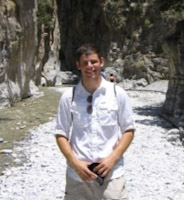 |
MATT ROSEN Matt Rosen is a sophomore majoring in Mechanical Engineering with a minor in Entrepreneurial Leadership. He is from nearby Brookline, Massachusetts, and graduated in 2008 from Brookline High School. Matt is involved with Engineers Without Borders, and at Tufts, he hopes to learn engineering and non-engineering skills that will give him the ability to help those in need. This past summer, he traveled to Panama where he gained an interesting perspective on rural health care. He loves to travel, see the world, and meet new people. In his free time, he plays for the Tufts Varsity Lacrosse team. |
 |
MARLI RUCK Marli Ruck is a sophomore from San Francisco. She is majoring in International Relations and concentrating in Asia. In the summer of 2009, she studied Mandarin in Beijing, and in the summer of 2008, she interned for the United Nations High Commissioner of Refugees in Bucharest. Over winter break, Marli visited Accra to evaluate corporate social responsibility in the gold mining industry as part of the Ghana Gold Colloquium. Her second semester at Tufts she joined a group of MIT grad students installing small scale concentrated solar plants in Lesotho for clinics and schools. She assessed the economic feasibility of expanding the project to Africa, Latin America, China and India. She is interested in an array of topics including the viability of a Green Revolution in Africa to kick start economies, understanding the operational structure behind the global Al Qaeda network and analyzing the vulnerability of American computer networks. At Tufts, Marli is part of the rock climbing and sailing team. |
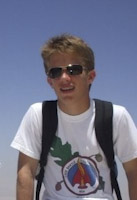 |
PATRICK SCHMIDT Patrick Schmidt is a freshman planning to major in International relations. He grew up in Overland Park, KS, but he has never missed an opportunity to leave the midwest, which is how he ended up at Tufts. Since he is new to Medford, he is looking for ways to get involved with the community, in addition to running for the Cross Country and track teams, and playing piano. In his free time, Patrick likes reading, listening to Lil Wayne, and sleeping. |
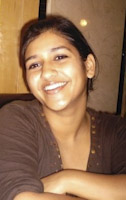 |
ALISHA SETT Alisha Sett is from Mumbai, India. She is a Sophomore majoring in International Relations (focus on South Asia and the Middle East) and English Literature. She is fascinated by, and has done some elementary research on, the works of James Joyce and Virginia Woolf. She’s a Salsera, and she works with the La Salsa group on campus, as well as with Salsa India in Mumbai. Alisha is passionate about all aspects of Theater, particularly Acting, Directing and Scriptwriting. She is a volunteer with the Boston Chapter of the Association for India's Development (AID). She is hoping to explore photography and journalism this year. Alisha loves to travel and to constantly meet new kinds of people. |
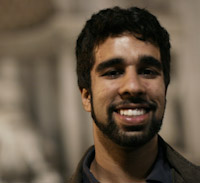 |
KAHRAN SINGH Kahran Singh is a senior, majoring in Computer Science and Engineering Psychology, and potentially Economics, if he continues on his current trajectory of trying to commit social suicide. He also serves as the Executive Business Director of the Tufts Daily, working to keep Tufts as one of the smallest schools in the country to have a daily paper. He spent the last year in London, with the good fortune to travel in much of the rest of Europe. While he has extensively traveled in India, he has not spent any time in the rest of South Asia and hopes to use his EPIIC experience as a catapulting point to learn more about the region and the places to make an impact. While programming jobs beckon after graduation, he would like to eschew them for the chance to do some work on the ground in the region. However, such plans are yet to be determined. |
 |
ALON SLUTZKY Alon Slutzky is a freshman from New Jersey and is planning on majoring in political science. He is interested in learning more about the preservation of civil liberties, poverty alleviation, and social justice. He spent the last summer in New Zealand and the previous summer interning for the Dennis Shulman campaign for Congress. He loves to travel, learn about other cultures, and discuss politics. Alon plans on joining TEMS, and playing intramural basketball. In his free time, Alon enjoys snowboarding, reading, and napping, but preferably not at the same time. |
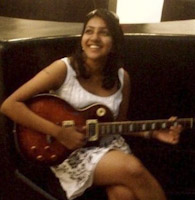 |
TAARIKA SRIDHAR Taarika Sridhar is a freshman and proudly represents Muscat, Oman. She is thinking of majoring in International Relations or Sociology, but wishes to do some very broad explorations before deciding on a major. Born in Mumbai but raised in Muscat, Taarika is highly interested in world politics and community development. She hopes to eventually work with major businesses and NGO’s by creating long-lasting relationships between the two groups to ensure sustainable efforts of NGO’s in various parts around the world. She also loves to travel, and has traveled to more than fifteen countries in her lifetime; some of which include Vietnam, South Africa, Uganda, Germany, Spain and Australia. Now she is at Tufts, ready to become an active participant and citizen on campus and in the world. |
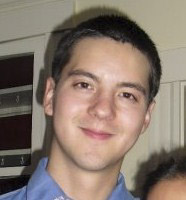 |
TOMO TAKAKI Tomo Takaki is a junior majoring in International Relations with a regional focus on the Middle East and South Asia (mostly South Asia). He currently resides in Seattle, Washington, but was born in Japan and holds dual US-Japanese citizenship. He is a member of Army ROTC and during the summer traveled to Morocco as part of a cultural internship program for Army cadets. He also visited Egypt for two months to study in an intensive Arabic program. On campus, he is involved with ALLIES, the IGL’s civil-military relations organization. In addition to all this, he likes puppies and taking long walks in the park. |
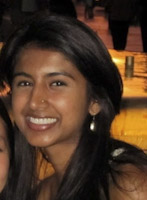 |
SAFIA TAPAL Safia Tapal is a senior majoring in International Relations and minoring in Chinese. She grew up in Karachi, Pakistan and currently lives in Millburn, New Jersey. She swam competitively in junior school and ran track all through high school, but her favorite sport is the one and only capture the flag. After studying abroad in Shanghai last fall, she re-discovered her love for Asia (especially the South!) and all the food it has to offer. She is grateful and excited to be a part of EPIIC this year! |
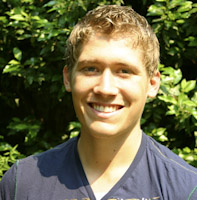 |
CODY VALDES Cody Valdes is a sophomore returning for his second year as a member of the E.P.I.I.C. colloquium. Born and raised in Vancouver, British Columbia, Canada, he has been a competitive hockey player for most of his life, a raw vegan for a little more, and now has found his passion in the pursuit of understanding the complexity of the world's most pressing and salient issues. As a freshman, Cody was a member of the Poverty and Power Research Initiative, conducting research over spring break in Manila, Philippines on the modern-day oligarchy of Asia's most corrupt country. He was also one of the founding members of a new Climate for Peace initiative to bring 100 percent renewable energy to the Gaza Strip in its reconstruction effort and to facilitate peace and reconciliation in the enduring conflict, Solar 4 Gaza/Solar 4 Sderot. This year he will continue his involvement in these projects, as well as coming aboard the student publication Discourse as its senior editor. |
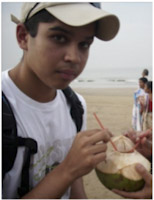 |
ARJUN VERMA Arjun Verma is a junior from Holmdel, New Jersey. He is studying International Relations and Arabic, with a focus in security studies. While at Tufts, Arjun has been involved in ALLIES, the student-led initiative within the IGL focused on civil-military relations. This summer, he served as an intern at The Atlantic Monthly. Arjun is a zealous New York Mets fan, though sometimes to the detriment of his health. In his spare time, he enjoys reading, boxing, and pizza. |
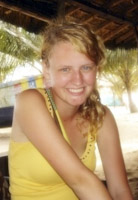 |
LAUREN VISEK Lauren is a senior from Chicago majoring in Quantitative Economics. Her interests are varied and include studying the effects of economic policy in developing countries. She is writing a thesis focused on food aid and will be participating in her second Tufts Fed Challenge of which she is a founding member. She also will be teaching math to grade school students with Literacy Corps. During her junior year, Lauren lived abroad and attended the University of Ghana in West Africa and the University of Hong Kong, which enabled her to travel throughout Thailand, Vietnam, Laos, and China. This last summer, she interned with an international law firm, helped refugees from Bhutan, Burma and Iraq adjust to U.S. life, and co-taught a U.S. citizenship class for African immigrants. Besides reading and traveling, Lauren loves to cook international recipes for friends, especially mango sticky rice. Lauren is thrilled to be a part of EPIIC and is looking forward to making new friends and intellectually traversing the important issues that face South Asia. |
|
|
TEACHING ASSISTANTS |
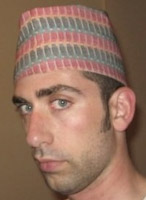 |
JOSHUA GROSS Joshua Gross is currently a student at the Fletcher School of Law and Diplomacy at Tufts University where he is a senior editor at the Fletcher Forum of World Affairs. He has previously served as the Director of Media Relations for the Embassy of Afghanistan in Washington, D.C., and as a consultant for the Project on National Security Reform. He recently returned from Nepal, where he worked with the Nepal Transition to Peace Initiative, a "track 1.5" facilitation body commissioned to support the efforts of the Government of Nepal to move the peace process toward a just and sustainable conclusion. He has been published in the Christian Science Monitor, Real Clear Politics, the Jerusalem Report, Global Post, the Diplomatic Courier, the Connecticut Post, the Forward, and the Detroit Metro Times. His writing has also appeared in the collection, “What Happened to Us These Last Couple of Years: An Anthology of the Bush Years.” He received his B.A. from the University of Michigan, where he was the recipient of the Avery Hopwood Award. |
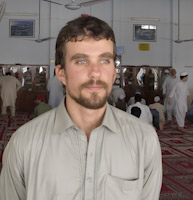 |
SAMUEL JANIS Samuel Janis is a second year MALD candidate at the Fletcher School of Law and Diplomacy specializing in Development Economics. He completed his undergraduate degree at the University of California Santa Cruz with a double major in Community Studies and History. Following a one-year hiatus as a wilderness therapist and backcountry ski guide in Colorado, Samuel returned to his native New York City in 2002 to embark on a public school teaching career. He is currently a New York State licensed social studies teacher (grades 7-12) with five years of experience teaching history, economics, and civics, as well as managing internship programs and various extracurricular clubs and sports. Samuel remains involved and deeply committed to urban public education reform and the New York City small schools movement. He continues to work closely and liaise with the New York Harbor School as it prepares to relocate from Bushwick Brooklyn to a new maritime studies facility on Governors Island. During 2007/2008 Samuel worked as the program director and lead teacher for the Himalayan Intercultural Semester, an innovative international education program based in the Ladakh region of the Indian state of Jammu and Kashmir. During this time he became enmeshed in the study of South Asian culture, history, and contemporary economic development. Samuel is now particularly focused on building institutions and partnerships to promote youth-led economic development and political reconciliation between India, Pakistan, and the United States. During 2009, he spent three months in Pakistan working as a research assistant with the National Rural Support Program and helping to coordinate and monitor a pilot project providing direct intervention, technical training, and micro-credit to the families of street children in the province of Punjab. Samuel plans to return to Pakistan next summer on a fellowship to continue language study and work with NRSP on international youth development and urban social mobilization. |
-->


